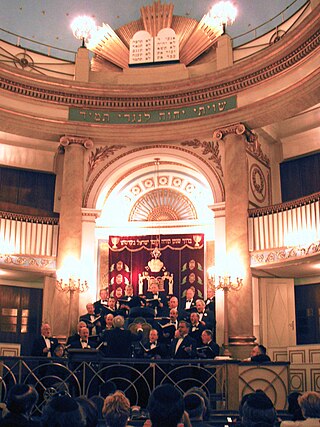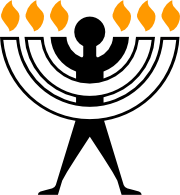The subject of homosexuality and Judaism dates back to the Torah. The book of Vayikra (Leviticus) is traditionally regarded as classifying sexual intercourse between males as a to'eivah that can be subject to capital punishment by the current Sanhedrin under halakha.

Reconstructionist Judaism is a Jewish movement based on the concepts developed by Rabbi Mordecai Kaplan (1881–1983) that views Judaism as a progressively evolving civilization rather than just a religion. The movement originated as a semi-organized stream within Conservative Judaism, developed between the late 1920s and the 1940s before seceding in 1955, and established a rabbinical college in 1967. Reconstructionist Judaism is recognized by many scholars as one of the five major streams of Judaism in America alongside Orthodox, Conservative, Reform, and Humanistic.

Women in Judaism have affected the course of Judaism over millenia. Their role is reflected in the Hebrew Bible, the Oral Law, by custom, and by cultural factors. Although the Hebrew Bible and rabbinic literature present various female role models, religious law treats women in specific ways. According to a 2017 study by the Pew Research Center, women account for 52% of the worldwide Jewish population.

A hazzan or chazzan is a Jewish musician or precentor trained in the vocal arts who leads the congregation in songful prayer. In English, this prayer leader is often referred to as a cantor, a term also used in Christianity.
Sherwin Theodore Wine, Hebrew name שמעון בן צבי, Shimon ben Tzvi, was an American rabbi and a founding figure of Humanistic Judaism, a movement that emphasizes Jewish culture and history as sources of Jewish identity rather than belief in any gods. He was originally ordained as a Reform rabbi but later founded the Birmingham Temple, the first congregation of Humanistic Judaism, in 1963.

Humanistic Judaism is a Jewish movement that offers a nontheistic alternative to contemporary branches of Judaism. It defines Judaism as the cultural and historical experience of the Jewish people rather than a religion, and encourages Jews who are humanistic and secular to celebrate their identity by participating in relevant holidays and rites of passage with inspirational ceremonies that go beyond traditional literature while still drawing upon it.
"Who is a Jew?" is a basic question about Jewish identity and considerations of Jewish self-identification. The question pertains to ideas about Jewish personhood, which have cultural, ethnic, religious, political, genealogical, and personal dimensions. Orthodox Judaism and Conservative Judaism follow Jewish law (halakha), deeming people to be Jewish if their mothers are Jewish or if they underwent a halakhic conversion. Reform Judaism and Reconstructionist Judaism accept both matrilineal and patrilineal descent as well as conversion. Karaite Judaism predominantly follows patrilineal descent as well as conversion.
Interfaith marriage, sometimes called interreligious marriage or "mixed marriage", is marriage between spouses professing different religions. Although interfaith marriages are often established as civil marriages, in some instances they may be established as a religious marriage. This depends on religious doctrine of each of the two parties' religions; some prohibit interfaith marriage, and among others there are varying degrees of permissibility.
Jewish feminism is a movement that seeks to make the religious, legal, and social status of Jewish women equal to that of Jewish men in Judaism. Feminist movements, with varying approaches and successes, have opened up within all major branches of the Jewish religion.
The City Congregation for Humanistic Judaism is a Humanistic Jewish congregation and synagogue at 30 West 26th Street in the NoMad neighborhood of Manhattan in New York City, New York, United States. It is the first Humanistic congregation in New York City to be led by a Humanistic rabbi.

Interfaith marriage in Judaism was historically looked upon with very strong disfavor by Jewish leaders, and it remains a controversial issue among them today. Many Jews followed the Talmud and all of resulting Jewish law Halakha until the advent of new Jewish movements following the Jewish Enlightenment resulted in the "Haskala"; in Halakha marriage between a Jew and a gentile is both prohibited, and also void under Jewish law.
Hashkafa is the Hebrew term for worldview and guiding philosophy, used almost exclusively within Orthodox Judaism. A hashkafa is a perspective that Orthodox Jews adopt that defines many aspects of their lives. Hashkafa thus plays a crucial role in how these interact with the world around them, and influences individual beliefs about secularity, gender roles, and modernity. In that it guides many practical decisions—where to send children to school, what synagogue to attend, and what community to live in—hashkafa works in conjunction with halakha or Jewish law.
Lesbian, gay, bisexual, transgender (LGBT) affirming denominations in Judaism are Jewish religious groups that welcome LGBT members and do not consider homosexuality to be a sin. They include both entire Jewish denominations, as well as individual synagogues. Some are composed mainly of non-LGBT members and also have specific programs to welcome LGBT people, while others are composed mainly of LGBT members.
Or Emet, officially the Minnesota Congregation for Humanistic Judaism, is a Humanistic Jewish synagogue and congregation in Minneapolis – Saint Paul, Minnesota, in the United States. The congregation is a member of the Society for Humanistic Judaism. It is a community of cultural Jews, secular Jews, Jewish humanists, and other humanists, united by a commitment to humanism and by respect and support for Jewish culture, traditions, and Jewish identity, and by those traditional Jewish values most consonant with humanism — tikkun olam, social justice. Or Emet embraces a human-centered philosophy that combines rational thinking and scientific inquiry with the celebration of Jewish culture and traditions.
Sivan Malkin Maas is an Israeli cleric who was the first Israeli to be ordained as a rabbi in Humanistic Judaism.
Miriam Jerris was the president of the Association of Humanistic Rabbis, and is the rabbi of the Society for Humanistic Judaism. She has been a member of the Society since 1970. In 2001, she was ordained as a rabbi by the International Institute for Secular Humanistic Judaism. She also has a PhD in Jewish studies with a specialization in pastoral counseling from the Union Institute and University in Cincinnati. In 2006, she received the Sherwin T. Wine Lifetime Achievement Award.

Machar, officially Machar, The Washington Congregation For Secular Humanistic Judaism, is a Humanistic Jewish congregation located in the metro area of Washington, D.C., in the United States. Affiliated with the Society for Humanistic Judaism, the non-theistic congregation was founded in 1977, and celebrates Jewish culture, education and celebrations. The congregation has a Jewish cultural school, social action committee, and regular newsletter, and welcomes interfaith couples.
This is a timeline of women rabbis:
Oraynu Congregation for Humanistic Judaism, founded in 1969, is Canada's first Humanistic Jewish congregation. It is based in Toronto, Ontario and is affiliated with the Society for Humanistic Judaism.
This is a timeline of LGBT Jewish history, which consists of events at the intersection of Judaism and queer people.






